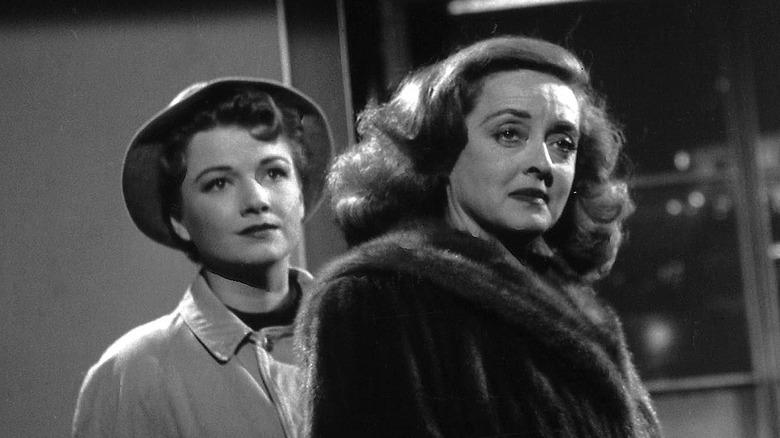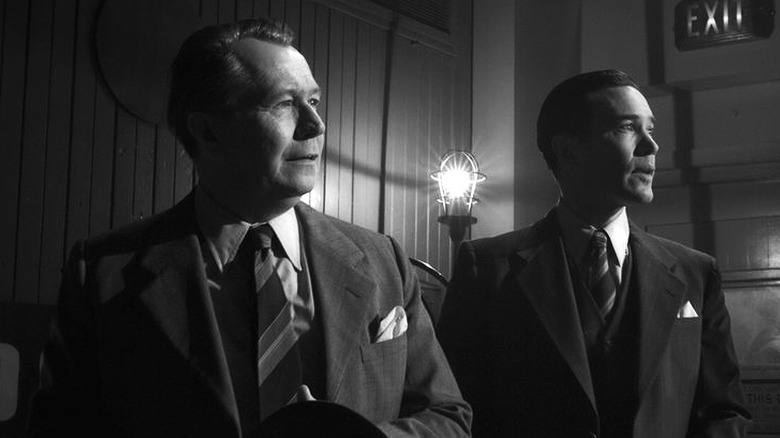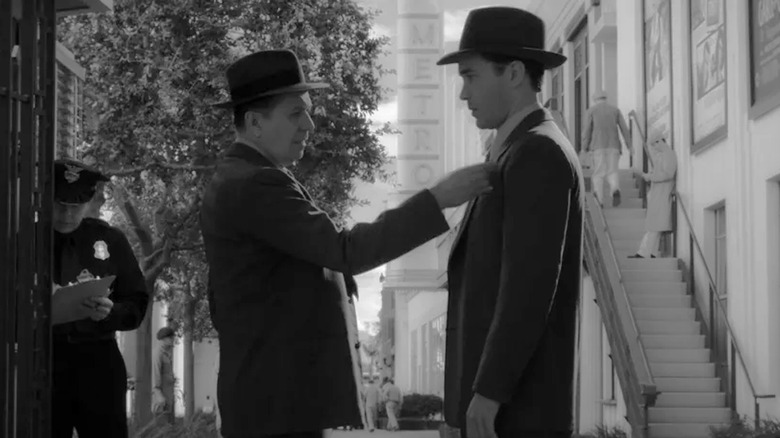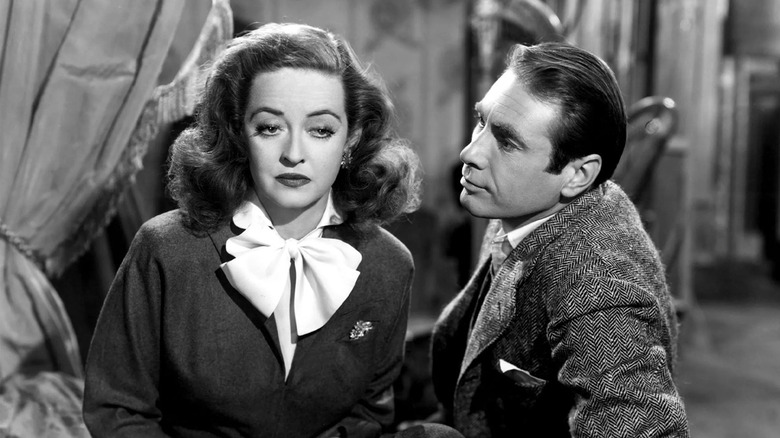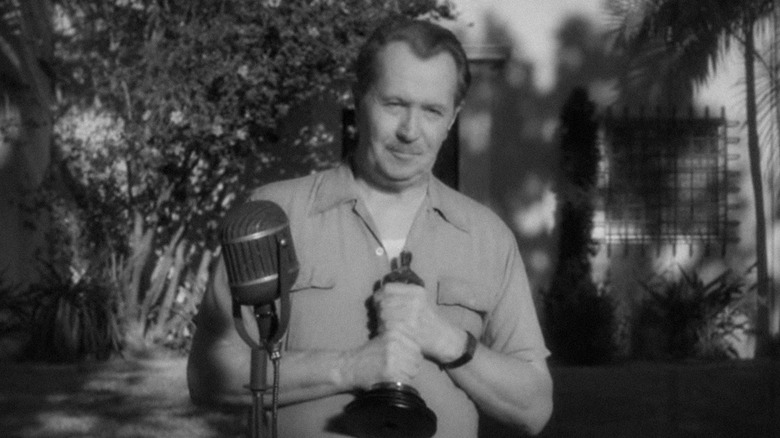The Sad Real-Life Story Behind All About Eve
Few films have managed to match the scathing wit — or the critical acclaim — of the catty backstage drama "All About Eve." The film follows veteran Broadway star Margo Channing and Eve, the die-hard fan hellbent on surpassing her in nearly every facet of her life. Despite the film's biting study of feminine ambition, "All About Eve" manages to portray each of its female characters with objectivity and dignity. It's the only film in Oscars history to bag four nominations for its female actors, cementing it as a pretty definitive feminist work even now.
The blistering rivalry between Margo and Eve is one of the most timeless conflicts you can find this side of "Mean Girls." The short story that inspired the film, "The Wisdom of Eve," focuses on an equally-feminine struggle. It's even become something of a queer Magna Carta in today's age, a status earned no doubt by the deliciously-sardonic Addison Dewitt and by Eve's own queer undertones. But a much more masculine conflict seems to have also shaped the film behind the scenes, one between director Joseph L. Mankiewicz and his brother, Herman J. Mankiewicz.
The Brothers Mankiewicz
The Mankiewicz family is one of those Hollywood dynasties that, while not technically a household name, helped lead the film industry from silent pictures into the sound era in the 1930's. Herman J. Mankiewicz is known best as the co-writer (or sole writer, depending on who you ask) of Orson Welles' "Citizen Kane," but even before he helped create the "greatest film ever made" — and became the subject of David Fincher's "Mank" (seen above) — Herman seemed like the larger-than-life main character of his own film. He was a decade older than Joseph, which gave him a pretty generous head start, and he didn't waste a minute of it.
As detailed by ScriptLab, Herman fought with the Marines during World War I, and later served as a publicist for the American Red Cross, before he turned to journalism. In his penultimate career change, Herman sharpened his writing talents further on Broadway. Then he set his sights on Hollywood.
By the end of the 1920's, silent films were being replaced by "talkies," which made dialogue more important than ever. This, in turn, made the sharp-witted Herman a key player in the transition. He went from an oft-uncredited screenwriter to the head of Paramount Pictures' scenario department, which gave him the power to hand-pick writers for the studio. He used his newfound clout to bring the best writers he knew to Hollywood, those who could match his own sardonic wit. One of those writers was his brother, Joseph.
Joseph's Rise to Fame
Joseph L. Mankiewicz didn't have nearly as varied a career as his elder brother. Though his time in the industry (and his unforgettable contributions to it) would span a sprawling 40 years, his beginnings were decidedly humble. Joseph's first job in film, working as a subtitle translator for a silent film company, is widely presumed to be his first job altogether. He eventually scored a contract with Paramount, via Herman, and spent four years honing his skills there.
Joseph also spent those years in Herman's indelible shadow, but it gave him ample time to study Herman's triumphs, as well as his mistakes. He learned pretty quickly that the real money in Hollywood — as well as the glory — was not in writing, but in producing and directing. As his hard-drinking, hard-gambling brother sank into debt and chafed under the studio system, Joseph's star began to rise.
In the mid-30's, Joseph transitioned to Metro-Goldwyn-Mayer, and there he produced films like "The Adventures of Huckleberry Finn" and "The Philadelphia Story." He would direct his first film, "Dragonwyck," after moving to 20th Century Fox in 1946. The films that followed — like "No Way Out," the late Sidney Poitier's breakout film — were modest successes, but the end of the decade would introduce him to "The Wisdom of Eve," providing the perfect vehicle for his magnum opus.
Buckle Up, Folks
It's not clear how or when Joseph came across the short story that inspired "All About Eve," but many agree that he must have seen something of himself and Herman in the clash between Margo and Eve. Joseph's rise to prominence in the 40's — and the slow but sure decline that Herman would face that same decade — matches the rivalry between the seasoned Broadway savant and her younger mentee. While the Mankiewiczs' own rivalry wasn't as contentious, there was undoubtedly conflict between the brothers.
Nick Davis, grandson of Herman, is one of the many Mankiewicz descendants adding context to the brothers' complicated relationship. The writer-producer gave context to the clash, telling The LA Times:
"Herman resented [Joe] for playing the game and for taking the game seriously, for succeeding at the game ... I think [Herman] felt like, 'Yeah, let's make the money and have some fun.' And then, the next generation that came along treated it like an art form ... [and] Joe passed [Herman] on the ladder. And Herman [was] like, 'Oh, my God. Can you believe my idiot brother is directing another picture for Fox?'"
Joseph would make 11 films for Fox; "All About Eve" was his tenth. By the time he'd begun his work on the picture, Herman's prospects were on the decline. His alcoholism and his gambling streak had already estranged him from many by the time he was tapped to write "Citizen Kane" in 1941. The film would secure him his first and only Academy Award, which he shared with Orson Welles, but his success was stunted by a number of circumstances. William Randolph Hearst, the newspaper magnate whose life Herman fictionalized for "Citizen Kane," was determined to shut the film down. Plus, Welles himself refuted Herman's contribution to the screenplay.
The Wisdom (and Legacy) of All About Eve
"Kane" was at once the nail in Herman's coffin and his defining contribution to film. He'd spend the rest of his career trying to recreate its success until his death in 1953 from uremic poisoning. Meanwhile, "All About Eve" would score a whopping 14 Oscar nominations in 1950. It marked the beginning of a winning streak for Joseph, one that would continue with films like "Julius Caesar," "The Barefoot Contessa" and "Guys and Dolls."
Margo's fate in "All About Eve" isn't nearly so tragic as Herman's, nor do Joseph and Eve share such unscrupulous motives. Both rise to fame and eclipse their mentors, but "All About Eve" acknowledges the fragility of that fame — at least when it's secured via less-than-honorable means. The younger Mankiewicz seemed to understand that fame is cyclical. Eve might have secured everything she ever wanted by the end of the film, but karma comes swift with the arrival of a younger fan looking to ingratiate herself to Eve... just as she did to Margo. This not only makes the film timeless, but in a way it shows that even the Mank brothers knew their lucky streaks would not last forever.
Granted, both Joseph and Herman have the benefits of a seminal legacy. Most of Herman's work, while uncredited while he was alive, has been attributed to him posthumously. The Mankiewicz brothers made an enduring mark on motion pictures, but a few auteurs have since come along and surpassed both filmmakers — or, as I prefer to look at it, built upon the foundation that both brothers helped create.
